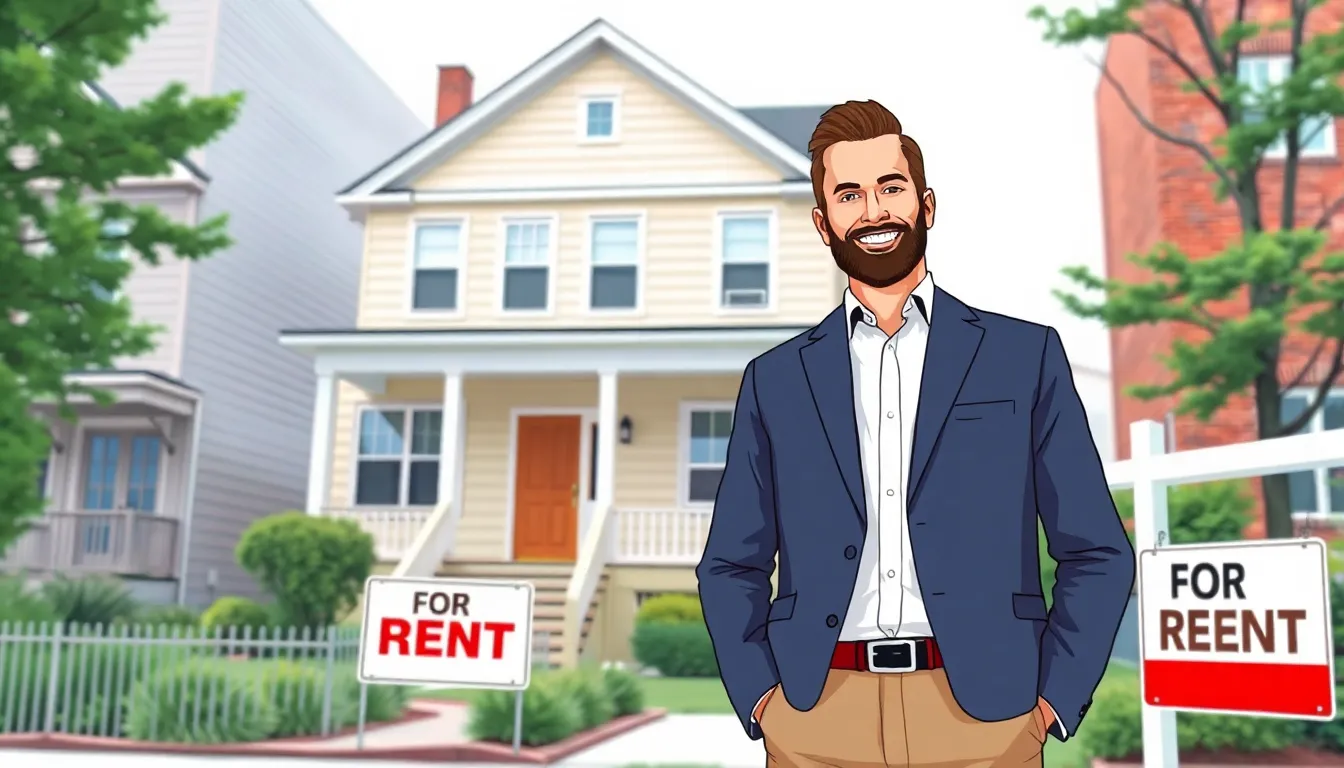Table of Contents
ToggleBeing a landlord isn’t just about collecting rent checks and fixing leaky faucets. It’s like hosting a never-ending reality show where the plot twists come from late-night phone calls and surprise visits. From charming tenants who treat your property like a palace to those who think “cleaning” means hiding everything under the bed, the landlord life is anything but boring.
Understanding the Role of a Landlord
Being a landlord encompasses various responsibilities beyond rent collection. It requires effective tenant management and an understanding of legal obligations.
Responsibilities of a Landlord
Landlords maintain the property, ensuring it meets safety and health standards. Timely repairs keep tenants satisfied and reduce vacancy rates. Communication remains key; regular check-ins can preempt many issues. Handling tenant disputes often demands diplomacy and problem-solving skills. Collecting rent consistently is crucial for cash flow. Understanding market trends can aid in setting competitive rental rates. Managing the lease agreement protects both landlord and tenant rights.
Legal Considerations
Landlords must comply with federal, state, and local housing laws. Fair Housing Act prohibits discrimination during tenant selection. Local ordinances may dictate tenant rights regarding repairs and eviction processes. Updating knowledge on laws protects landlords from potential legal disputes. Security deposit regulations vary by state, requiring clear guidelines. Lease agreements should outline all terms to prevent misunderstandings. Being informed on the legal process of eviction is essential.
Benefits of Being a Landlord

Being a landlord offers various advantages for those willing to embrace its complexities. Rewards can manifest both financially and personally.
Financial Rewards
Investing in rental properties often generates multiple income streams. Monthly rent payments provide regular cash flow, which helps cover mortgage expenses and property management costs. Significant appreciation in property value occurs over time, enhancing long-term wealth. Tax benefits may reduce taxable income, allowing deductions for repairs, maintenance, and depreciation. Landlords frequently enjoy financial stability through property investments and can benefit from leverage by using borrowed funds to acquire more properties. Enhanced cash reserves increase the ability to reinvest and grow portfolios.
Personal Growth
Being a landlord fosters essential skills that contribute to personal development. Communication skills improve as landlords interact with diverse tenants, addressing their needs and concerns. Conflict resolution skills emerge when handling disputes, teaching effective negotiation strategies. A deeper understanding of local laws strengthens one’s ability to navigate complex regulations, enhancing legal knowledge. Networking with other landlords and professionals cultivates relationships that can offer valuable insights and support. The role also builds resilience, as navigating challenges develops patience and adaptability. Engaging in property management promotes responsibility and encourages proactive problem-solving.
Challenges of Being a Landlord
Navigating the complexities of being a landlord presents distinct challenges that require attention and management skills.
Dealing with Difficult Tenants
Handling challenging tenants often creates stress and demands patience. Some tenants might neglect property maintenance or disregarding lease agreements. Communication strategies must adapt when addressing these issues. Consistent documentation of interactions helps in resolving disputes effectively. Eviction processes can also arise, necessitating knowledge of legal procedures specific to the area. Understanding tenant rights alongside landlord obligations is crucial for compliance. This careful balance fosters a professional landlord-tenant relationship.
Maintenance and Upkeep
Regular maintenance poses another significant challenge for landlords. Property upkeep ensures safety and satisfaction for tenants. Scheduling routine inspections can identify issues before they escalate. Timely repairs contribute to tenant retention and reduce long-term costs. Hiring reliable contractors is essential, yet finding trustworthy professionals within budget constraints can be difficult. Budgeting for unexpected repairs, such as plumbing or electrical issues, also remains a priority. Landlords must remain vigilant to maintain property value and meet tenant expectations.
Tips for Successful Landlording
Effective landlording involves strategic communication and clear expectations with tenants. These factors significantly contribute to positive tenant relationships and property management.
Communication with Tenants
Successful landlords prioritize regular communication. They establish an open dialogue with tenants to address concerns promptly. This communication can include sharing property updates, maintenance schedules, or changes to lease agreements. Using multiple channels for communication, like emails and texts, ensures tenants stay informed. Listening actively to tenant feedback fosters trust and cooperation. Encouraging tenants to report maintenance issues immediately helps maintain property standards. It also reduces the chance of small problems escalating into significant repairs.
Setting Clear Expectations
Clearly defined expectations streamline the landlord-tenant relationship. Use lease agreements to outline responsibilities for both parties. Address issues such as rent payment dates, property maintenance, and rules regarding common areas. Providing tenants with a detailed welcome package helps clarify policies and local regulations. Establishing guidelines for how disputes will be handled can prevent misunderstandings. Regular reminders about important deadlines can also reinforce expectations. When landlords communicate these details upfront, it leads to fewer conflicts and a more harmonious renting experience.
Being a landlord is a multifaceted endeavor that demands adaptability and resilience. The journey is filled with unique challenges and rewarding experiences that shape one’s skills in management and communication. While navigating tenant relationships and property maintenance can be daunting, the potential for financial gain and personal growth makes the effort worthwhile.
By embracing proactive strategies and fostering open communication, landlords can create a positive environment for both themselves and their tenants. Ultimately, the role of a landlord is not just about property management; it’s about building lasting relationships and contributing to a community. With the right mindset and approach, the landlord experience can be both fulfilling and profitable.





